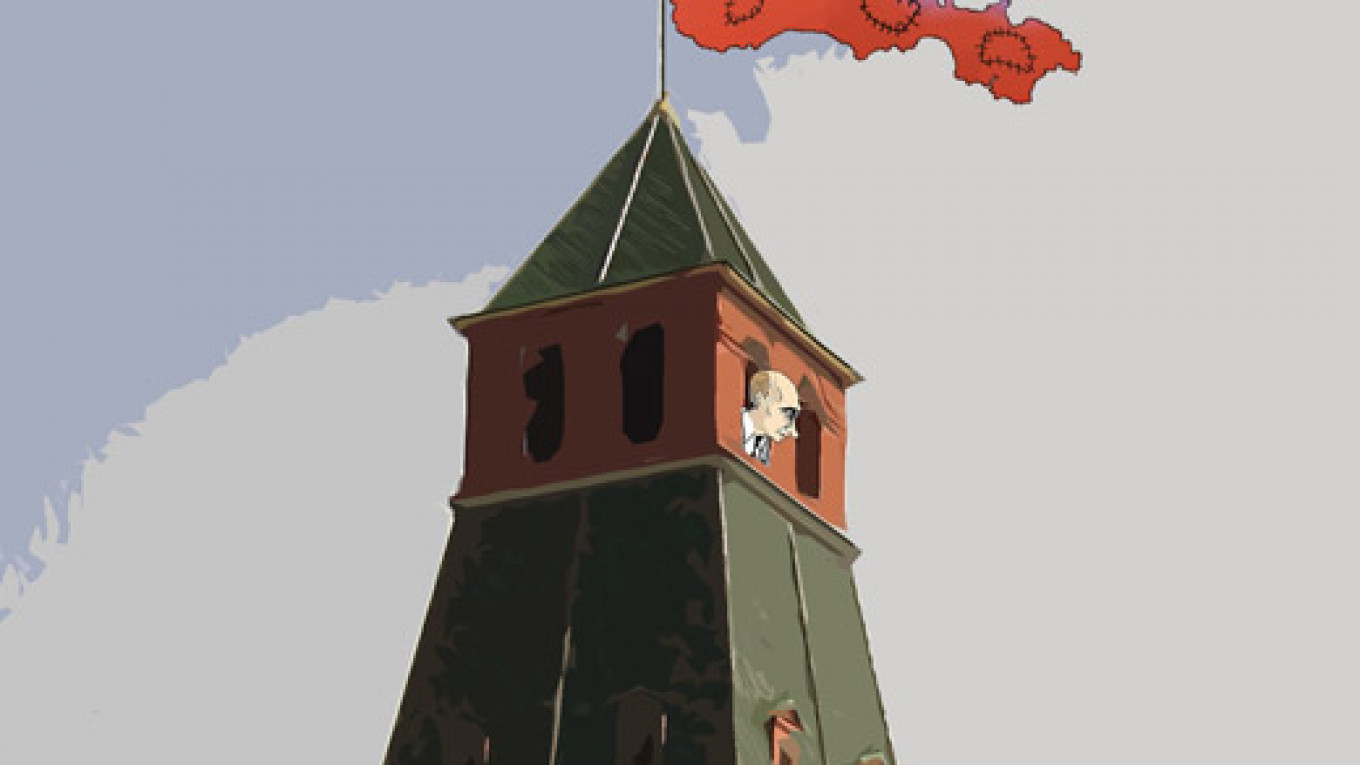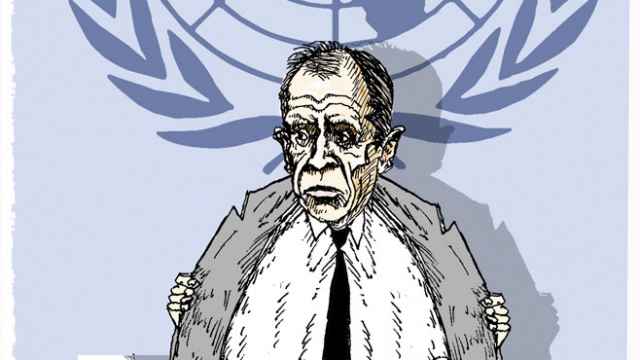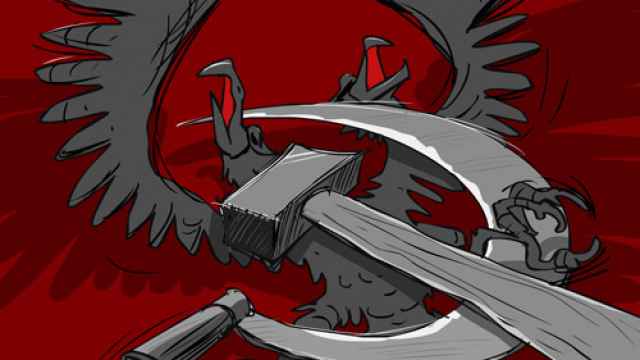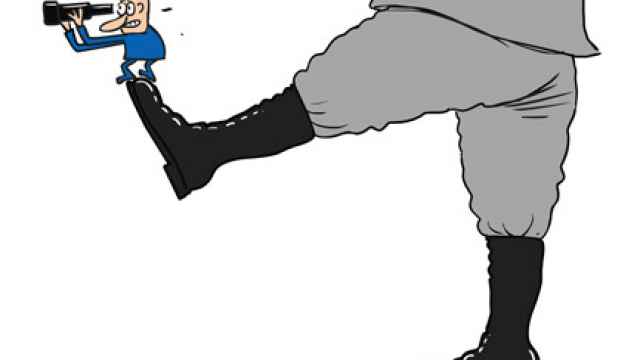One year and one month have passed since both chambers of the Federal Assembly gave President Vladimir Putin a standing ovation when he announced that Crimea was once again part of the Russian state.
Opinions differed over that move in very specific ways.
Some were not so much unhappy with the annexation as they were concerned with the possible consequences. "Such things are not done in the modern world," they argued. "Russia will have to pay a high price for it, and this country is not in strong enough condition to have the luxury of redrawing the map of Europe. In six months, or one year at the most, Russians will be singing a different tune than they are today," they said.
Others were euphoric. "This is only the beginning," they said. "Russia has finally stopped back-stepping. Now everything will be different. The situation will improve and the country will have a new life!"
That was the voice of the majority. Frankly, even many people whose education, age and accumulated experience living in this country would have ordinarily put them in the camp of the doubters and critics, were also wildly enthusiastic about the annexation.
And although most of my friends and family members and I never dreamed at the time of celebrating the annexation, I understood then, and still do now, why others were so happy about it.
Imagine a city where something once went seriously wrong many years ago, but still within memory of the living generations. The ships of that city plied the oceans of the earth, astronomers observed the constellations and the residents were proud and happy for their children.
Not everything went smoothly. The city was led by a succession of decrepit and small-minded old men. Secret police had the authority to monitor and decide the fate of anyone they pleased. The military demanded so many arms and ammunition that, one day, the city's residents did not have enough food.
The people believed their difficulties were only temporary and that their fathers and grandfathers had suffered through much worse. But it soon became clear that the city was falling into decline.
The situation gradually improved, but the city remained in the shadows despite the fact that trade rapidly gained pace and some townspeople became truly wealthy. However, the richest citizens left town and even those with lesser means who remained behind dreamed of sending their children to study and live abroad. It seemed as if the city had lost all hope for its future.
And then suddenly, amid this gloom, someone climbed the tower atop the town hall and raised the beautiful old flag of the city that the citizens had not seen for a quarter of a century. The people raised their heads and smiled at the flag flapping in the wind. Some had tears in their eyes, and all, without exception, felt the spark of hope for a better future rekindle in their chests.
Crimea was such a flag for Russia.
Who was right one year ago — those who anticipated inevitable retribution, or those who celebrated victory?
It seems neither.
Skeptics expected the West to mount an immediate response. They knew nobody would go to war against Russia with its nuclear weapons, but they felt the country was in such poor condition that the very first sanctions would put those presumptuous boys in the Kremlin in their places.
But 13 months have passed, and an increasing number of publishers around the world are printing maps that show Crimea in the same color as the Urals, Siberia, the Caucasus and Karelia.
The same boys sit in the Kremlin. True, prices are rising and millions of Russians are out of work — but no more than were unemployed during the hopelessly gloomy early 1990s.
And most importantly, Europe is sending signals that, despite the catastrophic loss of confidence in Russia, the old continent is looking for ways to restore cooperation. France might refund Russia for undelivered warships.
Western leaders might decide to prolong or even strengthen sanctions, but the speech that German Chancellor Angela Merkel gave on April 17, in which she said a free trade zone project with Russia is important to Germany, told Putin exactly what he wanted to hear — namely, that no matter what happens, Russia is not the type of country that the West can afford to ignore.
Perhaps those analysts were right when they claimed all year long that Putin waged his campaign in Ukraine to win the respect Russia was lacking.
In the 21st century, history is written weekly, not yearly or even every 10 years. Russia has owned Crimea for one full year. The country did not collapse under sanctions — perhaps to its own surprise. There is no reason to doubt that if Russia manages to avoid making any fatal errors over the next 12 months, Crimea will become part of the new status quo in Eastern Europe.
Perhaps that is not the status quo Russia envisioned for itself back in 1991, or in 2007 when Putin made his famous speech at the security conference in Munich. But it is one that Russia has convinced its international partners to accept.
Whether we like it or not, that is a success for Putin and his place in history. Does that mean those who were rejoicing one year ago were right? I'm afraid not.
First, that flag appeared over the town hall a full 15 years after Putin came to power. Putin did not use the authoritarianism that characterized his 15 years in power as a tool to build, through unceasing daily labor, the foundation for Russia's prosperity.
Unfortunately, whatever foundation he did manage to build will probably soon collapse. Even if by some miracle the newly raised flag stops the process of decline, it cannot erase the effects of all that happened during Putin's 15 years in power, much less during the Soviet era for which he holds so much nostalgia. Those decades of destruction and neglect will not just disappear.
Second, it appears that the act of raising that flag awakened sleeping demons. For example, former defense minister of the self-proclaimed republic of Donetsk Igor Strelkov was scheduled to deliver a public lecture at a federal university.
Strelkov arrived with several dozen supporters whom the university's security guards refused to admit. Strelkov's supporters simply ignored them, lifted the traffic-control barrier by hand and walked onto the university grounds.
Strelkov's lecture lasted four hours — exactly the same length as Putin's recent live call-in show. Putin, who had to endure extremely hard-hitting questions about the state of the economy on that show, became visibly more relaxed when responding to questions about Ukraine and the West. Nevertheless, at the end he said that Russia has "no enemies" today.
That might be hypocrisy and contrary to Russia's military doctrine and everything that the Kremlin has been doing for the last few years. But he did speak those words. And yet, without exception, every follow-up program on state-controlled television analyzing that call-in show was animated by a spirit indicating that nobody had even heard Putin say that Russia has no enemies today.
Perhaps television is a clumsy tool, and if audiences had been worked into hysteria by a year of propaganda reminiscent of the Third Reich, it is impossible to abruptly switch gears and conduct a calm discussion as to whether Russia really has enemies.
And maybe the demons that were released from their chains this year are so powerful that nobody can manage or control them. If so, Putin's success will go unnoticed amid the chaos that might soon unfold.
Ivan Sukhov is a journalist who has covered conflicts in Russia and the CIS for the past 15 years.
A Message from The Moscow Times:
Dear readers,
We are facing unprecedented challenges. Russia's Prosecutor General's Office has designated The Moscow Times as an "undesirable" organization, criminalizing our work and putting our staff at risk of prosecution. This follows our earlier unjust labeling as a "foreign agent."
These actions are direct attempts to silence independent journalism in Russia. The authorities claim our work "discredits the decisions of the Russian leadership." We see things differently: we strive to provide accurate, unbiased reporting on Russia.
We, the journalists of The Moscow Times, refuse to be silenced. But to continue our work, we need your help.
Your support, no matter how small, makes a world of difference. If you can, please support us monthly starting from just $2. It's quick to set up, and every contribution makes a significant impact.
By supporting The Moscow Times, you're defending open, independent journalism in the face of repression. Thank you for standing with us.
Remind me later.






